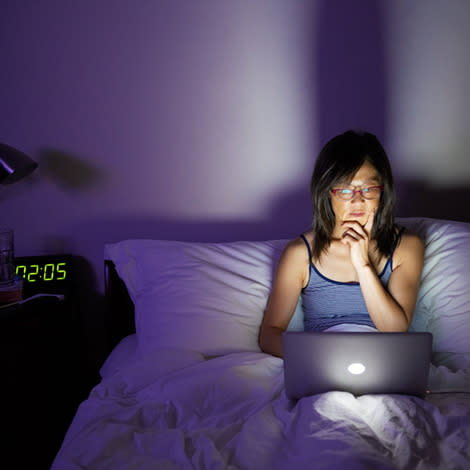Do You Need a Digital Detox?
by Alanna Nuñez for SHAPE.com

Can you go more than a few hours without checking your Facebook? Does the idea of being away from your laptop or iPad make you break out into a sweat? Do you spend so much time on the Internet that you're ignoring your friends, family, and work? If you said yes, yes, and yes, you may be addicted to the Internet.
Internet addiction is a hotly debated topic within the medical community. According to the American Psychiatric Association, it's not an official psychiatric disorder, so it's not in the Diagnostic and Statistical Manual of Mental Disorders (DSM). However, the country's first inpatient treatment program for Internet addiction opened this week at Bradford Regional Medical Center in Pennsylvania. Designed to house up to four patients at one time, the program aims to provide a 72-hour digital detox and lasts 10 days total. Because Internet addiction is not considered a mental illness, the treatments won't be covered by insurance.
"We're really behind other countries in treating this problem," psychologist Kimberly Young, Ph.D., who founded the program, told CNN. "China, Korea, and Taiwan all have treatment centers. Here in the United States, people who need treatment don't have anywhere to go. Now, we finally have something to offer people."
RELATED: The Best Health and Fitness Sites for Women
However, not everyone agrees that Internet addiction is a nationwide problem that needs to be fixed, saying that there's not a solid way to differentiate between a slightly bad habit and a life-ruining addiction. "The best comparison I can think of is that it's similar to caffeine," Allen Frances, M.D., professor emeritus at Duke University and author of Saving Normal, told SHAPE. "Millions of people consume it and probably depend on it every day, but it doesn't interfere with or ruin their lives."
So many people use the web daily that it probably is true that a small group of them are addicted, but there's not enough research to make that distinction, according to Frances. Plus, when something becomes "medicalized," a whole new set of problems is created, he says. "It's too hard to draw a line between someone who's addicted to the Internet and someone who simply uses the Internet a lot. At this point there's way too much excitement surrounding this."
In contrast, Young is convinced the center will help hardcore addicts and expects to see behavior similar to that of drug or alcohol addicts. "I've been studying Internet addiction since 1994," Young told CNN. "When you talk about the controversy behind it, laughing it off, that's often been the case with my work."
Even if you don't believe yourself to be addicted to the web, it could be beneficial to take a short digital detox, if for no other reason than that the constant checking of your Facebook, email, or laptop means you're probably not focusing 100 percent on the task in front of you, whatever it may be (though people tend to think they're great at multitasking, studies suggest otherwise). A good way to give yourself a break from the Internet without quitting it cold turkey is by taking a short break every 90 minutes or so. Spending 10 minutes walking, meditating, listening to music, or talking with a colleague are all practical and easy ways reset your brain, according to an article by Entrepreneur. Or try to minimize distractions and maximize your productivity by vowing to check your email every 15 to 30 minutes instead of every three to five.
RELATED: 7 Simple Ways to Detox Your Life in 48 Hours
What do you think? Can you be addicted to the Internet? Tweet us @Shape_Magazine or let us know in the comments below!
More on SHAPE:
The Fastest Way to Lose Belly Fat
30 Things We Appreciate About Running
14 Healthy Oatmeal Toppings You Need to Try
